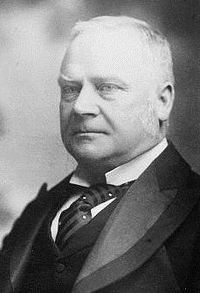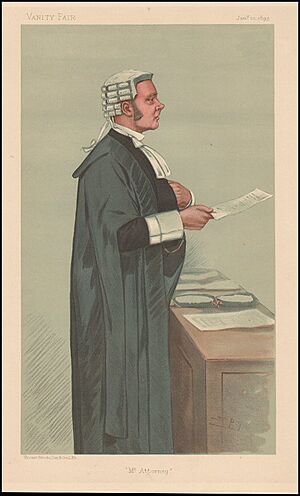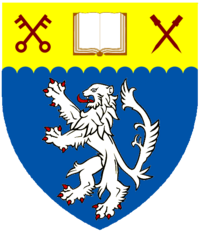Robert Reid, 1st Earl Loreburn facts for kids
Quick facts for kids
The Earl Loreburn
|
|
|---|---|
 |
|
| Lord High Chancellor of Great Britain | |
| In office 10 December 1905 – 10 June 1912 |
|
| Prime Minister | Sir Henry Campbell-Bannerman H. H. Asquith |
| Preceded by | The Earl of Halsbury |
| Succeeded by | The Viscount Haldane |
| Personal details | |
| Born | 3 April 1846 Corfu Town, Corfu, United States of the Ionian Islands |
| Died | 30 November 1923 (aged 77) Walmer, Kent |
| Nationality | British |
| Political party | Liberal |
| Spouses | (1) Emily Fleming (d. 1904) (2) Violet Hicks-Beach |
| Alma mater | Balliol College, Oxford |
Robert Threshie Reid, 1st Earl Loreburn (born April 3, 1846 – died November 30, 1923) was an important British lawyer and judge. He was also a Liberal politician. He held a very high position called the Lord High Chancellor of Great Britain from 1905 to 1912. This role meant he was the head of the justice system and a key government minister.
Contents
Early Life and Education
Robert Threshie Reid was born in Corfu, a city on the island of the same name. At that time, Corfu was under British protection. His father, Sir James John Reid, was the Chief Justice of the Ionian Islands. His mother was Mary Threshie.
Young Robert went to Cheltenham College and then to Balliol College, Oxford University. While at Oxford, he was a talented cricket player. He played in fifteen professional matches as a wicket-keeper between 1865 and 1868. He continued to play cricket for many years, even for famous clubs like the Marylebone Cricket Club (MCC).
Political Journey
Robert Reid's journey in national politics began in 1880. He was chosen to be a Member of Parliament (MP) for Hereford. He served in the House of Commons until 1885.
After a short break, he returned to the House of Commons in 1886. This time, he represented Dumfries Burghs. During his time as an MP, he took on several important legal roles. He became the Solicitor General in 1894 and was also knighted that year. Later, he served as the Attorney General from 1894 to 1895. In 1899, he received another special honor, becoming a Knight Grand Cross of the Order of St Michael and St George (GCMG).
In 1905, he left the House of Commons. He was then appointed Lord Chancellor by Prime Minister Sir Henry Campbell-Bannerman. When he became Lord Chancellor, he was given a special title: Baron Loreburn. This title was named after a stream near Dumfries, which was important to the town's history.
Disagreements in Government
During the early 1900s, some Liberal politicians believed in an idea called Liberal Imperialism. This meant they supported a strong British Empire and alliances with other powerful countries. Key figures like H. H. Asquith and Sir Edward Grey were part of this group. They wanted a close friendship with France and a strong British army ready for war, especially against Germany.
When Campbell-Bannerman formed his government, he chose Loreburn as Lord Chancellor. Loreburn was known for his different views. He was seen as a balance against the Liberal Imperialists.
In 1908, Asquith became Prime Minister. Loreburn often disagreed with other powerful ministers, including Asquith himself. These disagreements became more noticeable, especially about foreign policy and military plans. In 1911, some top ministers met secretly to discuss military aid to France. When other Cabinet members, including Loreburn, found out, they were very upset. They believed that all major decisions should be made by the full Cabinet.
Becoming Earl Loreburn
On July 4, 1911, Robert Reid was given an even higher title: Earl Loreburn. However, his health began to get worse. In the summer of 1912, he had to step down from his role as Lord Chancellor.
When he left, he wrote a letter to a colleague, Lord Haldane. He explained his long-standing disagreement: "You have been an Imperialist... and in my opinion it is quite impossible to reconcile Imperialism with the Liberal creed which we professed." This showed his strong belief that imperialism did not fit with true Liberal values.
Views on War and Women's Vote
As a war in Europe seemed likely in 1914, Loreburn was against Britain getting involved. He was pleased when a newspaper, Manchester Guardian, criticized how Britain seemed to have secretly promised to support France and Russia.
In 1918, the House of Lords discussed a new law, the Representation of the People Act 1918. This law was very important because it would allow some women to vote for the first time. Loreburn tried to remove the parts of the law that gave women the vote. However, the Lords did not agree with him, and his amendment was defeated.
Family Life
Lord Loreburn married Emily Fleming in 1871. She passed away in 1904. He then married Violet Elizabeth Hicks-Beach in 1907. He did not have any children from either marriage. Lord Loreburn died on November 30, 1923, at the age of 77. Since he had no children, his titles ended when he died.
Images for kids
See also
|





